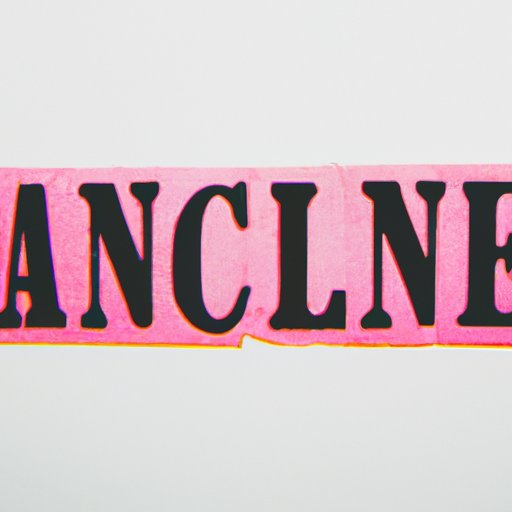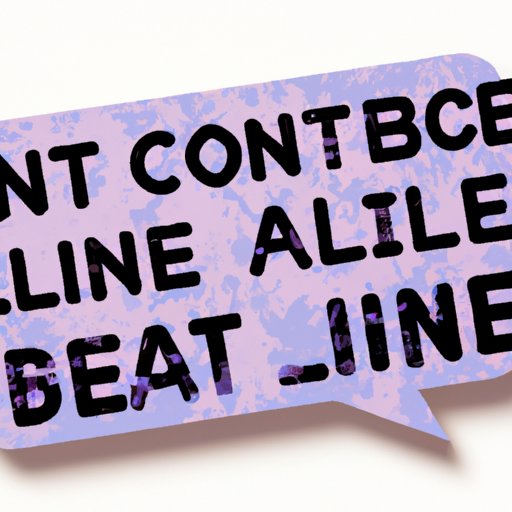Introduction
In recent years, the term “cancel culture” has become increasingly popular as a way to describe the practice of publicly denouncing or boycotting someone or something due to their offensive behavior. Cancel culture is often seen as a form of digital vigilantism, where individuals can express their disapproval without having to resort to physical violence. While it has been used for both positive and negative ends, cancel culture has become a contentious issue, with some arguing that it can lead to censorship and an erosion of free speech.
To understand the implications of cancel culture, it is important to first look at the pros and cons associated with it. This article will explore the benefits and drawbacks of cancel culture, as well as its impact on social norms, political discourse, social media, and activism.

Exploring the Pros and Cons of Cancel Culture
When discussing cancel culture, it is important to consider both the potential benefits and drawbacks of this phenomenon. On one hand, it can be argued that cancel culture provides a platform for increased accountability, allowing people to call out offensive behavior and hold those responsible to account. On the other hand, there are concerns that cancel culture could lead to mob mentality, a lack of due process, and potential for abuse.
Benefits of Cancel Culture
One of the main advantages of cancel culture is that it allows for increased accountability. By publicly denouncing an individual or organization, people can make sure that their actions are not ignored or swept under the rug. This can also encourage people to think twice before engaging in inappropriate behavior, as they know that they will be held accountable for their actions.
Cancel culture also allows for open dialogue and discussion. By bringing public attention to certain issues, people can engage in meaningful conversations about the topics that matter to them. This can help to foster empathy and understanding, which can lead to more productive conversations.
Finally, cancel culture can promote empathy by giving people a platform to express their feelings. By speaking out against offensive behavior, people can show solidarity with those who have been wronged and demonstrate that they care about the issues that are important to them.
Drawbacks of Cancel Culture
While there are some potential benefits to cancel culture, there are also some drawbacks that should be taken into consideration. One of the main concerns is the potential for online mob mentality, where people jump onto the bandwagon without taking the time to consider all the facts. This can lead to the spread of misinformation, as well as a lack of due process for those accused of wrongdoing.
Another potential problem with cancel culture is that it can be abused. People may use it as a way to silence dissenting voices or target individuals they disagree with, rather than engaging in constructive dialogue. This could lead to further polarization and incivility.

An Analysis of How Cancel Culture Has Changed Society
Cancel culture has had a significant impact on society, particularly in terms of changing social norms and altering political discourse. In the past, offensive behavior was often tolerated or overlooked, but today it is much more likely to be publicly denounced and criticized. This has led to a shift in attitudes towards what is deemed acceptable, and has encouraged people to take a stand against injustice.
The rise of cancel culture has also changed the way people engage in political discourse. Before, it was common for people to engage in civil debate, but now it is more likely for people to resort to name-calling and personal attacks. This has led to a further polarization of politics, with people becoming entrenched in their own views and unwilling to compromise.

Examining the Impact of Cancel Culture on Social Media
Social media has played an important role in the rise of cancel culture, as it provides people with a platform to express their opinions and call out offensive behavior. The popularity of platforms such as Twitter and Facebook has allowed people to quickly spread their message and reach a large audience. This has led to an increase in user engagement, as people flock to these sites to discuss current events and share their thoughts.
Analyzing the Role of Media in Promoting Cancel Culture
The media has also had a hand in promoting cancel culture, as news outlets often amplify messages and spread information quickly. This can be beneficial, as it can bring attention to important issues and allow people to voice their opinions. However, it can also lead to the spread of misinformation, which can fuel the flames of cancel culture.
Investigating How Cancel Culture Impacts Political Discourse
Cancel culture has had a profound impact on political discourse, leading to an increase in incivility and a decrease in compromise. The prevalence of cancel culture has made it more difficult for politicians to engage in meaningful debates, as they are often quick to resort to personal attacks and name-calling. This has resulted in a further polarization of politics, with people on both sides of the aisle becoming more entrenched in their beliefs.
Evaluating the Impact of Cancel Culture on Activism
Cancel culture has had a major impact on activism, both positively and negatively. On the one hand, it has strengthened certain causes by providing a platform for people to speak out and draw attention to important issues. On the other hand, it has decreased interest in compromise, as people are reluctant to engage in civil discourse and prefer to focus on calling out offensive behavior.
Investigating People’s Attitudes Towards Cancel Culture
To better understand people’s attitudes towards cancel culture, it is important to look at public opinion polls and research studies. According to a 2020 survey by Pew Research Center, a majority of Americans (60%) believe that cancel culture goes too far in trying to get people to adhere to certain standards of conduct. However, a smaller percentage (35%) said that cancel culture is necessary to hold people accountable for their words and actions.
Research studies have also found that people generally view cancel culture in a negative light, as they perceive it as a threat to free speech and open dialogue. A 2019 study conducted by researchers at the University of Pennsylvania found that people were more likely to express negative emotions when discussing cancel culture, including anger, fear, and disgust.
Conclusion
Cancel culture has become an increasingly important issue in today’s society, as it has the potential to both benefit and harm individuals and institutions. While it can provide a platform for increased accountability and open dialogue, there are also concerns about online mob mentality, lack of due process, and potential for abuse. It is clear that cancel culture has had a major impact on social norms, political discourse, social media, and activism, and it is important to consider the implications of this phenomenon moving forward.
(Note: Is this article not meeting your expectations? Do you have knowledge or insights to share? Unlock new opportunities and expand your reach by joining our authors team. Click Registration to join us and share your expertise with our readers.)
